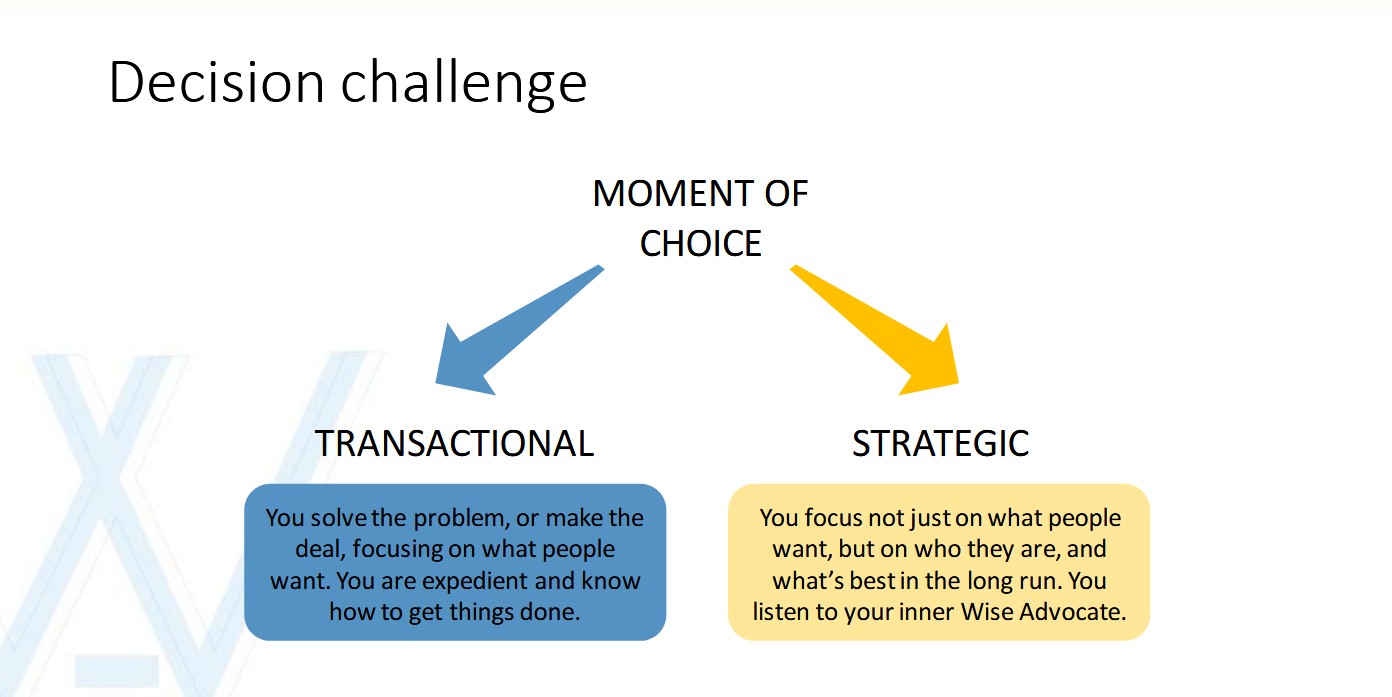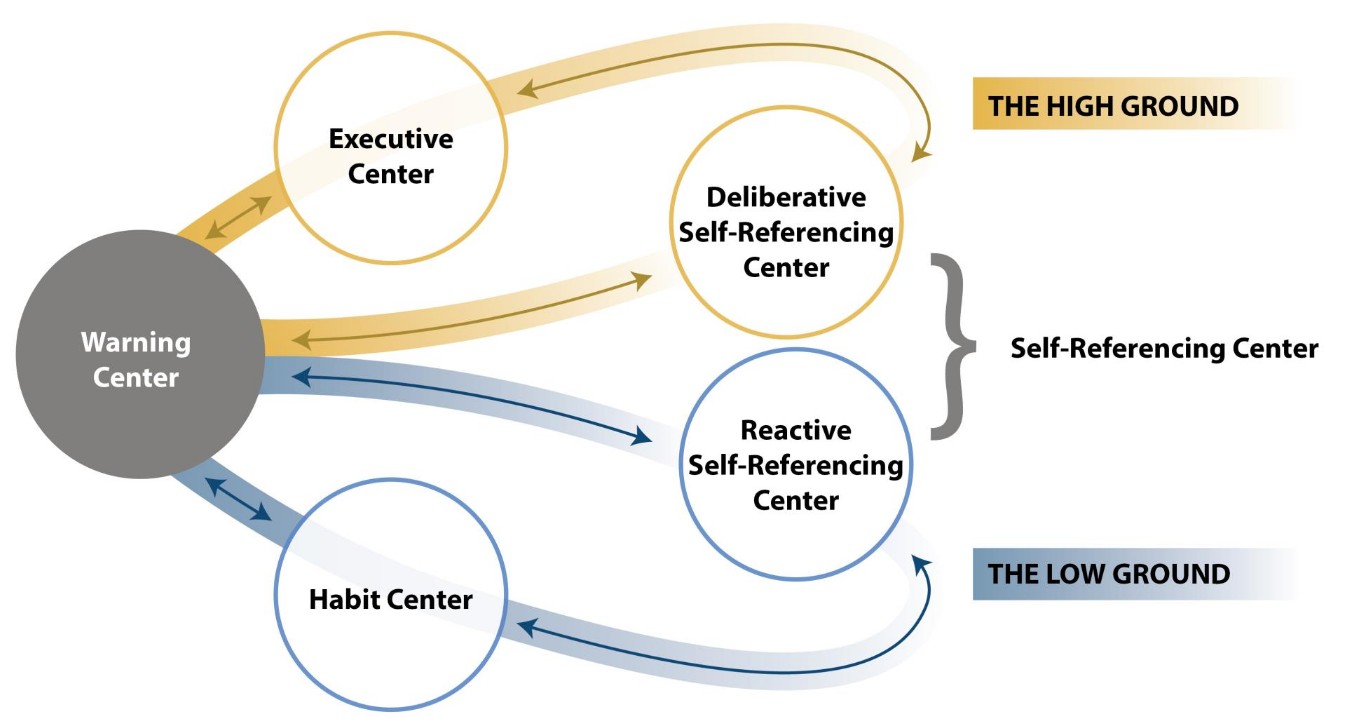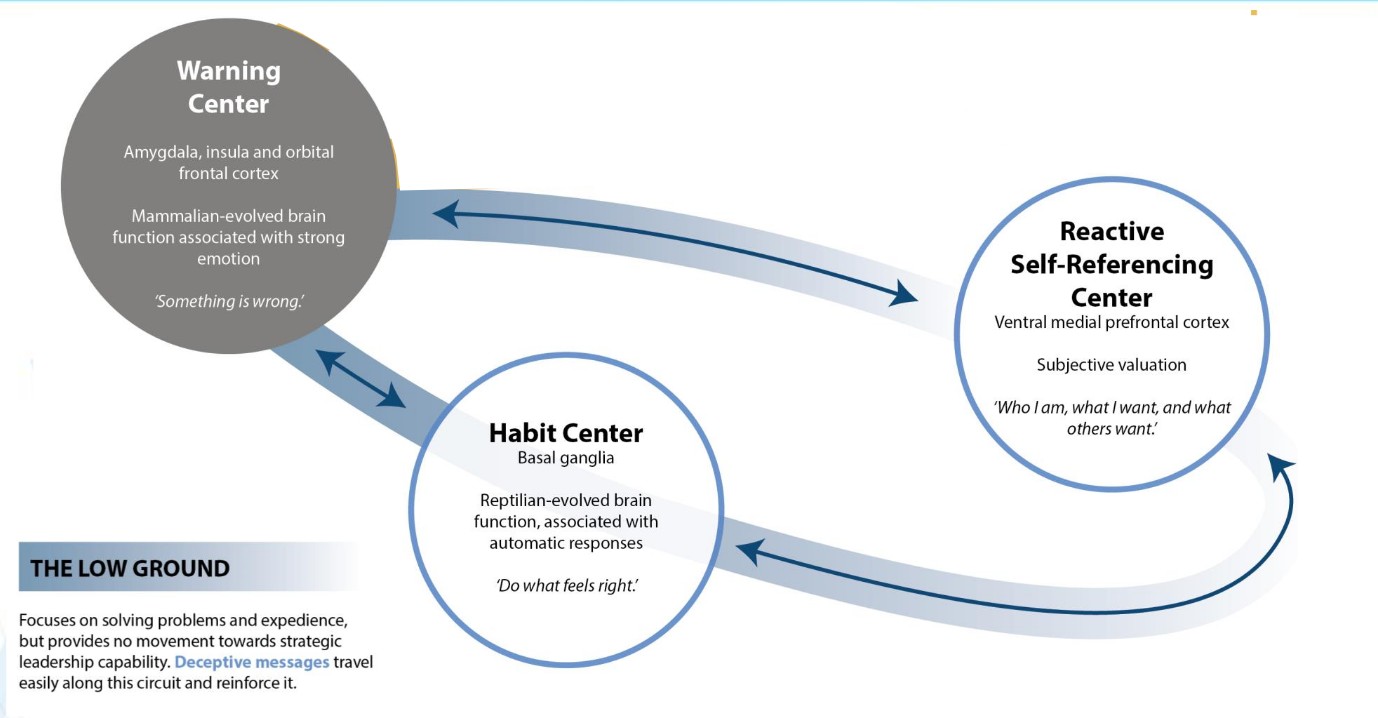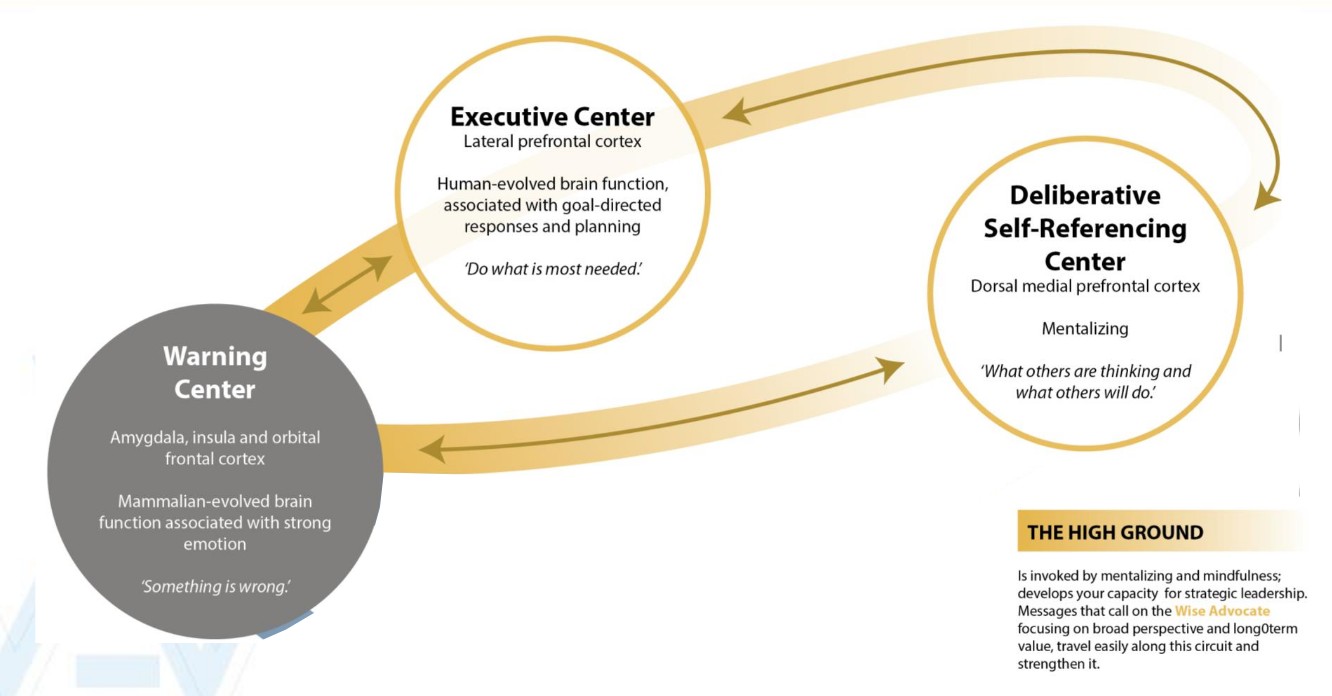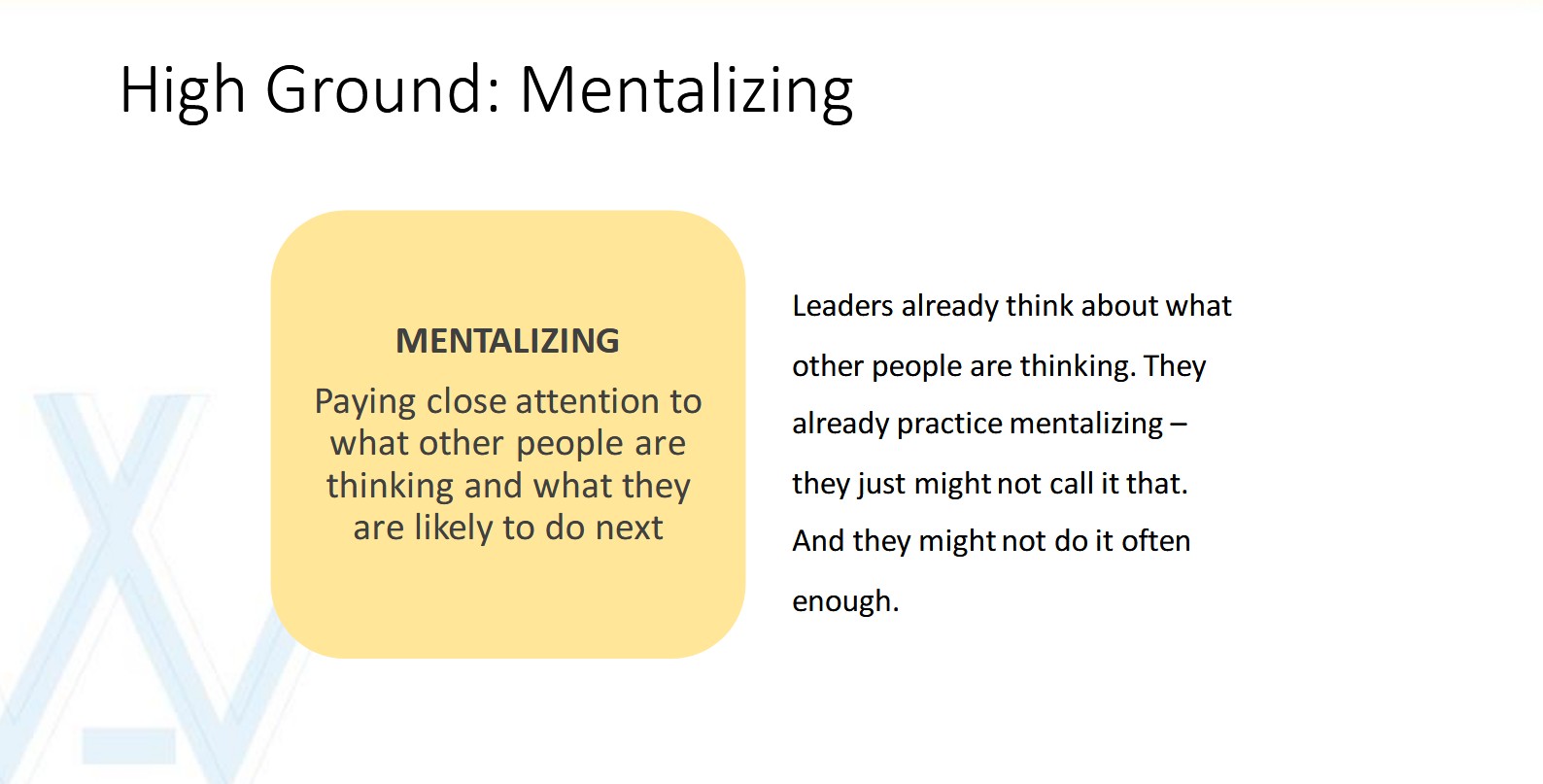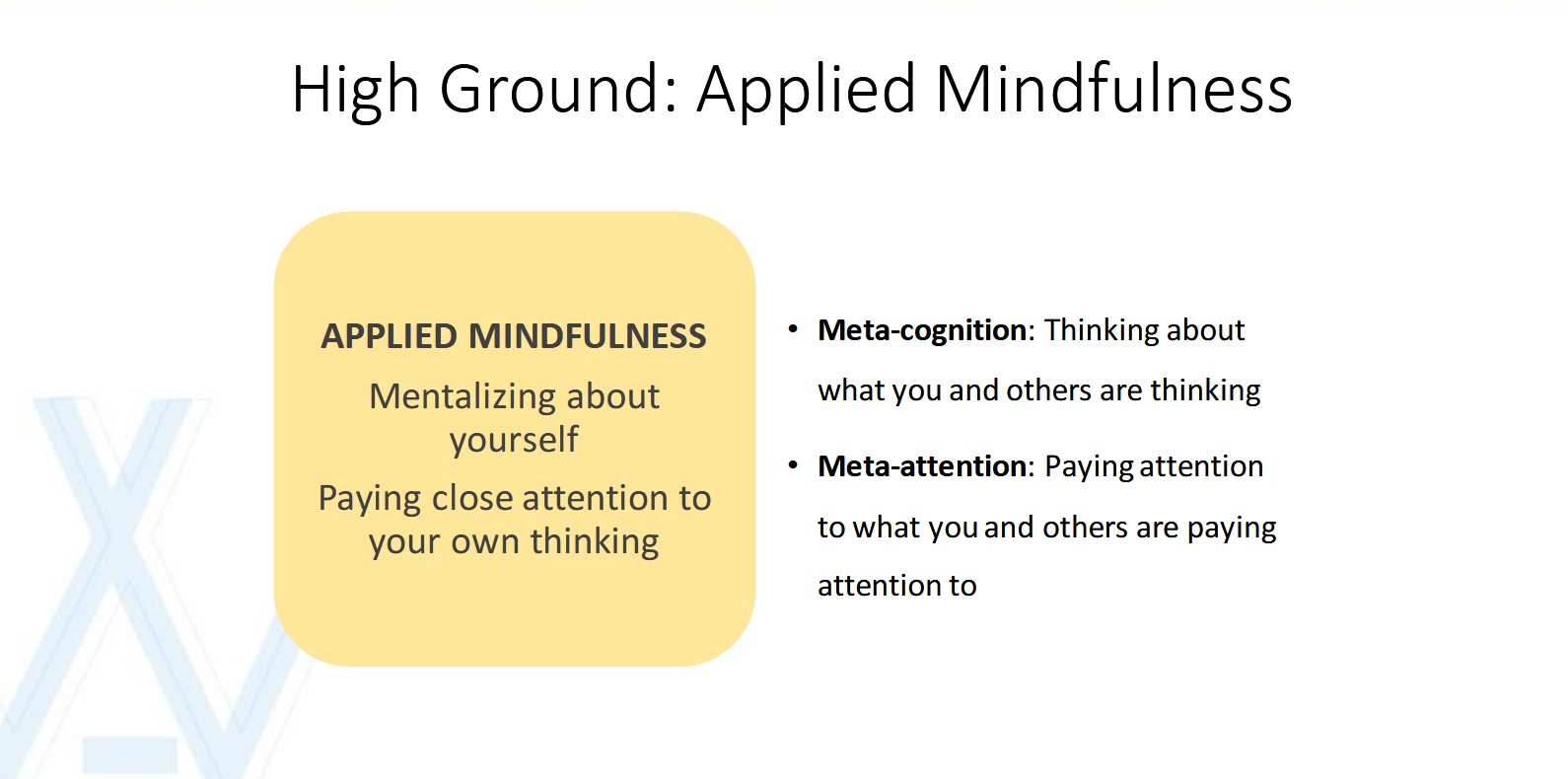The Wise Advocate
Helping You Achieve The Very Best Outcome
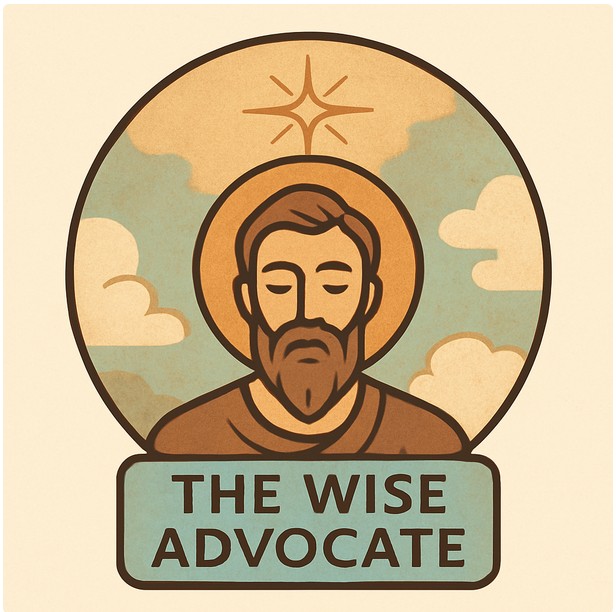
What Is The Wise Advocate?
When we talk of 'The Wise Advocate' its easy to think of the consigliere in 'The Godfather' or 'The Sopranos' or similar dramas based around mafia bosses.
In fact we all have such a counsellor - but with a more benign intent - and it is an aspect of our attentive mind.
This is a mental facility that has been known about and used by wise leaders and a minority of lay people throughout history.
Neurologically, this is your brain’s “higher-order control and compassion network”, mainly prefrontal regions working together with emotion-regulating circuits to give you a calm, nurturing inner guide.
This is not a pre-programmed entity but a dynamic and adaptive capability that emerges as the brain's complex system learns to integrate and regulate various cognitive functions like self-reflection, inhibitory control, and perspective-taking. to achieve transformational outcomes.
You may not be aware of it but it is always there
This is the voice within, the mind-oriented, dispassionate perspective of a clear-minded observer, helping you see yourself and your actions as others might see them. This inner voice may not be obvious to everyone, but it is always there.
You experience it is as an inner presence that is available to you whenever you activate it and tune into it.
This voice is not just concerned with what is good for you, but also what is good from you.
Qualities of The Wise Advocate
- Meta-awareness - It watches your thoughts and emotions from a higher vantage point, allowing you to notice reactive patterns without getting caught in them.
- Long-term perspective - It weighs future consequences and broader goals instead of being driven solely by immediate gratification.
- Compassion and clarity - It often speaks with a calm, guiding voice that encourages understanding, self-compassion, and fairness toward others.
- Integration of intuition and reason - It blends analytical thinking with gut feelings, making decisions that feel “deeply right,” not just rational.
- Ethical guidance - This aspect helps you stay true to your moral compass, particularly under stress or when facing complex choices.
You can think of it as your mindful inner coach that emerges when you’re fully attentive and self-aware.
It's similar to how in mindfulness practice there’s a part of your mind that simply knows when you’re off balance, and gently redirects you toward wisdom and presence.
A life changer
Learning how to activate and engage with this part of you is probably one of the most important thinking skills you can acquire to make the best decisions for yourself, all those you love and care about and all those you lead.
The Wise Advocate is the focal point of all the hundreds of articles I have written and posted on this site over the past 10 years, this is where thinking skills and the practice of mindfulness all come together. I feel that this is the most important and practical subject I have written about to date. This one really is a life changer!
It addresses three key questions:
- How do I figure out the right right decision to make?
- How do I position myself so that decision achieves the given objective?
- How do I develop the habit of making better choices, time and time again, especially in situations of uncertainty and complexity?
At the moment when you make your choice, certain things take place in your mind and brain that will help you to make the best decisions that will transcend your limits and enable you to become your best self.
Insight reveals the pattern - but change only holds when authority sits above thought.
This is all about:
- How you prioritize: what, when, and where you focus your attention to resolve the given issues.
- How you consciously choose to take the high road and make choices and decisions that are transformative rather than merely transactional.
Filters out deceptive messages from your primal brain
This voice identifies and filters all deceptive brain messages that frequently arise from your primal brain and labels them for what they are. These messages are always negative and usually overstate the perceived threat
Unfiltered, these anxious feelings of impending danger (especially those related to the experience of past threats) can activate such intensity of emotional overwhelm that they override all other thinking and response. This is known as “amygdala hijack.”
This helps explain why awareness alone may clarify what is happening without necessarily changing what happens next - a distinction explored in Why Insight Alone Does Not Change Behaviour.
Speaks with the voice of your personal belief system
The wise advocate integrates seamlessly with your personal ethics and values, and your own personal spiritual and philosophical beliefs and practices. It will always communicate with you using the language and symbolism of your own beliefs.
For example, for the Buddhist it will express itself from the perspective of the Buddhamind, for the Christian this will be voice of the Holy Spirit, for the atheist it will be expressed in humanist terms and so on.
The experience of this voice has been described as that of a wise, benevolent friend. The tone is warm, supportive and compassionate.
The more you engage with it the stronger it gets
This voice develops and improves via self-directed neuroplasticity, meaning that repeated focused attention and mental practice strengthens specific neural pathways, leading to the enhanced development of this capacity.
A further effect of this is that you rewire your brain to bypass the default transaction based thinking, instead you respond using this transformative facility.
100% science based - no fluff!
If you are reading all this with scepticism and maybe some cynicism, let me assure you that what we are talking about here is not some warm, fuzzy, feel-good vibe, this has a solid scientifically verifiable neurological foundation. This is very real.
The term "The Wise Advocate" was originated by Dr Jeffery Schwartz an American psychiatrist, neuroscientist and researcher in the field of neuroplasticity and its application to obsessive-compulsive disorder. He set out a 4 step process for rewiring your brain to deal with negative thoughts and bad mental habits in You Are Not Your Brain.
I have used and applied this material over several years and it has transformed my thinking and whole approach to life.
Before we get into the mechanics of how to use this facility it is helpful for you understand a little of how it works. This will then make it easier for you to use it. Here is an overview of what is covered: If you want to skip the explanation and move straight to the action points you can do that on the link below: How To Activate And Engage With The Wise Advocate Please Note:
How Does The Wise Advocate Work?

The Choice In situations where a decision is required as to what action to take, you are likely to focus your attention in one of two basic ways.
We call one pattern of mental activity the Low Road, because it
favours expedient actions aimed at giving you what you want and giving
others what they want, as rapidly and efficiently as possible. The
other pattern, the High Road, shows itself as the mental
construct we call The Wise Advocate. This is the voice within your mind that makes the
case for solutions with longer-term and broader benefits. The Low Road is transactional, the High Road is strategic. The repeated pattern of how you think rewires your brain.
[A] The Low Road The
Low Road is the pattern of mental activity, and the related brain
circuits, involved in meeting life's challenges in an expedient way. When
you make deals, design rewards and incentives, or think about
satisfying your needs or the needs of others, you
are on the Low Road. This activity often elicits powerful emotions, such as desire, anxiety, fear, frustration, elation, and relief. In everyday life, most of us occupy the Low Road most of the time. The Low Road connects three major functions of the brain.
[1] The Reactive Self-Referencing Center
This brain
function is associated with the ventral medial prefrontal cortex (vmPFC)
and it has been labelled The Reactive Self Referencing Center because
it is activated when there are thought processes or sensory stimuli that
are mainly related to your self. The focus of brain function is transactional and it is concerned with what is valuable and relevant, for example: The Reactive Self-Referencing Center accounts for 50% of the overall
Self-Referencing Center, the other 50% is labelled the Deliberative
Self-Referencing Center, and this relates to the High Road. The overall Self-Referencing Center is involved in many aspects of your personality and identity, especially: Me, myself and I. Low Road self talk is all about you! [2] The Warning Center This is a collective label for three parts of the brain: the amygdala, the insula, and the orbital frontal cortex. The Warning Center creates feelings of fear and anxiety, and the instinctive
gut-level sense that someone or something is worth getting involved with or steering clear of. Be aware of the 'amygdala hijack'! Does this sound familiar? [3] The Habit Center This brain function is associated with the basal ganglia and is popularly referred to as the 'lizard brain'. The Habit Center runs your basic behaviours that don’t require conscious attention as they have become habits through constant repetition, for example: closing the door and then locking it,
driving your car, brushing your teeth etc. The low road is where deceptive brain messages come from. All-or-nothing thinking. The end justifies the means. Be honest, how many times have you said this to yourself!?
[2] The Warning Center
As with the Low Road, The Warning Centre is a collective label for three parts of the brain: the amygdala, the insula, and the orbital frontal cortex.
It creates feelings of fear and anxiety, and other associated emotions. However the practice of mindfulness provides a healthy gap between the emotions arising and your chosen response, i.e. your response is chosen is and not just an automatic impulsive "knee jerk" reaction.
[3] Executive Function
This third function on the High Road - referred to as the Executive Center - associated with the lateral prefrontal cortex.
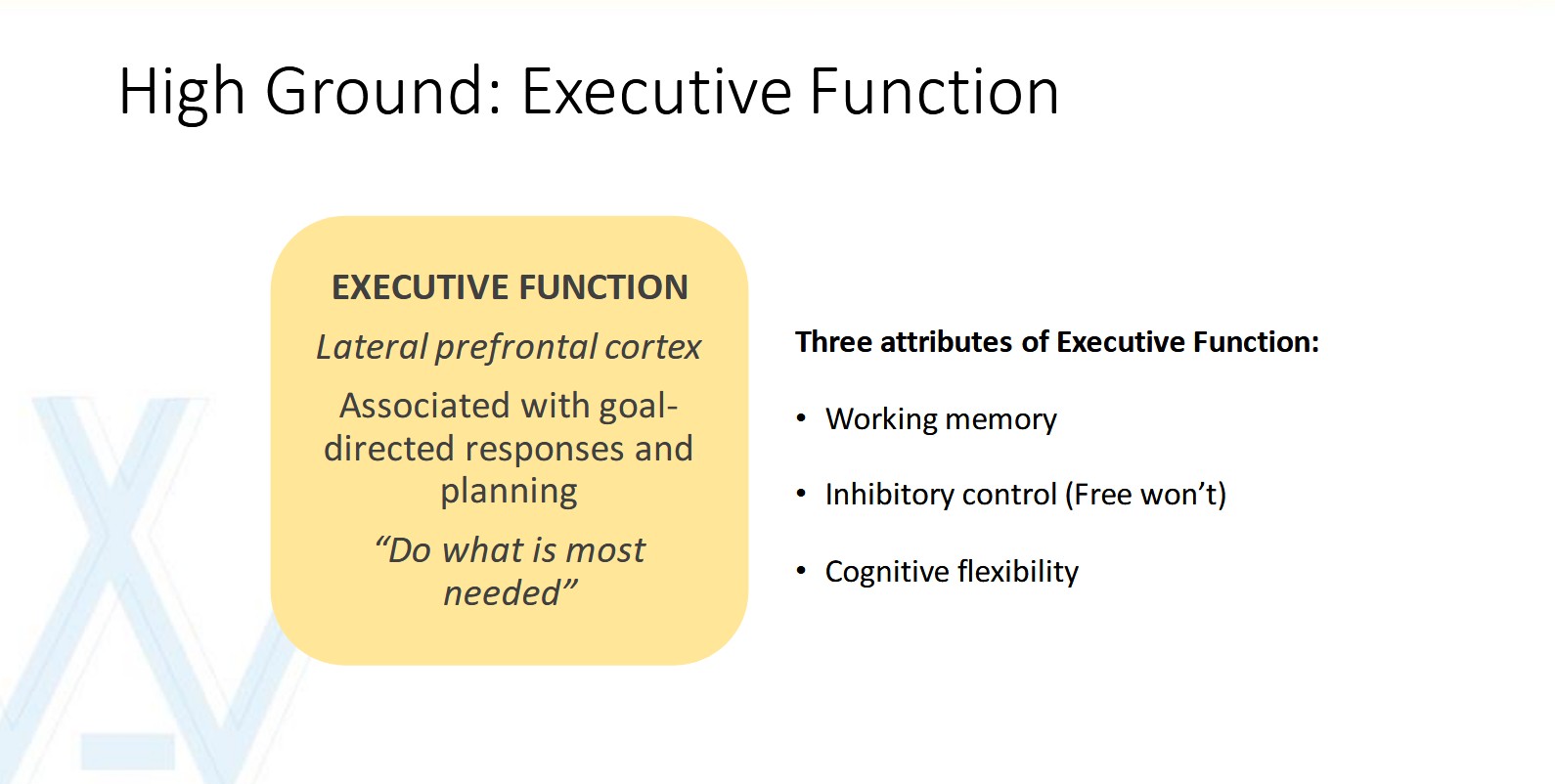
The 3 functions of The Executive Function are;
[a] Working memory
- This is the ability to keep information accessible so your conscious attention can work with it.
- It's a mental workspace that allows us to keep information active in our minds, enabling us to think, learn, and solve problems effectively
[b] Inhibitory control
- This is the ability to suppress inappropriate actions, thoughts, or emotions in favor of more suitable ones.
- It allows us to resist impulses, manage distractions, and adjust our behavior to achieve goals.
- The practice of mindfulness can help improve inhibitory control.
[c] Cognitive flexibility
- This enables us to adapt our thinking and behavior in response to changing circumstances or new information.
- It allows for smooth transitions between tasks, thoughts, and situations, and is essential for problem-solving and adapting to new rules or environments
- Using mental models and developing thinking skills can significantly improve cognitive flexibility, a key aspect of executive function in the brain.
Accessing and engaging with The Wise Advocate is a transformative process and it can change your life. I was talking with a friend recently. Let's call her Susan. She was widowed at at an early age and is a single parent.
Susan has been through some very difficult times over the past
10-15 years regarding work [and the lack of it], lack of money, health
issues, family issues, relationship issues, and the sheer hassle of
living in a developing country. She was sharing how toxic and overwhelming her thoughts and feelings can be sometimes, and she said: "I need a new brain!" "Well Susan, here is how to have a new brain!" I
am writing these guidelines for you, and sharing them here with any
reader who also really wants to make these changes and, over time,
transform their life. There are two keys to making this work:
1. Daily Mindfulness Practice
Regular mindfulness meditation is
essential as it builds non-reactive awarenes and enhances your cognitive
powers. Susan, let the stillness speak! Resources Here is your step by step guide: Further Resources Key Tip 1: # Make Mindfulness A Living Breathing Daily Habit. This way you rewire your brain. Key Tip 2: # Create a Space Between Stimulus and Response.
When you get hit by an event that triggers you, for example: Pause and take one slow breath before reacting and avoid the amigdala hijack. You can also the technique I showed you above for dealing with overwhelm.
Why? Between stimulus and response these is a space. In that space is your power to choose your response. This pause
activates your Wise Advocate, giving it time to assess and make suggestions. Instead of letting your automatic impulses take over and unleashing a torrent of toxic thoughts and feelings, you have the choice to take the high road and choose growth and freedom. Useful Further Reading: When You Stop Doing, Life Speaks The power of doing nothing - transformation doesn't require more, but less.
2. Daily Practice Of Deep Acceptance & Compassionate Self-Talk
Deep Acceptance Susan, the simple but powerful practice of deep acceptance frees you from the burden of your emotional reactions to the events and circumstances of your life. If you do this simple practice every day, you will release all the negative feelings that you carry around with you and which drag you down. Resources Here is your step by step guide:
I have used this deep acceptance process so many times and it always works.
Key Tip 1: # Don't think about it just do it Key Tip 2: # This is a daily practice. Drop Your
Story And Talk Kindly To Yourself Susan, most of the stuff you tell yourself is, at best a guess, and at worst, complete rubbish. Resources Here is your step by step guide: Key Tip: # Nothing has any intrinsic meaning other than that which you choose to give it Useful Further Reading: Drop The Story - How To Deal With Your Demons and Transform Your Life The way forward, learning how to drop the
story, is not to deny or resist what your brain is doing, but to work
with it.
3. Talk With Your Wise Advocate Every Day
Susan, this is where things get interesting. In the introduction to this article I said that the
wise advocate integrates seamlessly with your personal ethics and
values, and your own personal spiritual and philosophical beliefs and
practices. I also said that it will always communicate with you using the language and
symbolism of your own beliefs. For example, for the Buddhist it
will express itself from the perspective of the Buddha mind, for the
Christian this will be voice of the Holy Spirit, for the atheist it will
expressed in humanist terms and so on.
Susan I know that you are a spiritual woman, raised in the Christian
tradition and also an occasional practitioner of mindfulness meditation
so I am going to frame what I say now from that perspective.
For
the reader who is not a practitioner or devotee of a faith
tradition this idea of prayer will likely not resonate and possibly provoke a negative reaction, so think of this as a form of self talk with a higher part of yourself - however you choose to define that.
Buddhist teacher Zuisei Goddard expresses this rather well: "Often, prayer is associated with a god or gods, as an act of worship,
reverence, supplication. I think of it more broadly and more simply as
being in relationship with ourselves... So, praying, to me, is to be in relationship with a deeper, larger, more connected, more integral part of our being." You may also found this article helpful: Does Prayer Work? The Psychology of Prayer, Meditation and Outcomes Action Point: In this resource link, substitute the word "Consciousness" for the "The Wise Advocate": The Wise Advocate - Relationship Guidelines Key Tip: # When facing a decision, just ask: The experience of the Wise Advocate voice has been described as that of a wise, benevolent friend. The tone
is warm, supportive and compassionate.
4. Align The Wise Advocate With Your Core Values - Daily Reminder
Susan have you ever asked yourself: "What is my life purpose?" If you choose to take the high road - this question goes far beyond the day-to-day grind of trying to survive. It is one of the most powerful forces in your life and
has a major bearing on how your wise advocate functions. So Susan, what is your answer to this question? It cuts straight to the heart of who you are and why you are here.
Write down your answer and your top 3 guiding values . Resource: Key Tip: If
you knew you were going to die tonight and you were given a few minutes
to reflect before that happened, what would you say was the meaning of
your life? Your Wise Advocate becomes stronger when it has a clear compass to work with during moments of uncertainty.
5. Develop Your Thinking Skills - Practice Daily
Susan a large part of the difference
between the experienced decision maker who makes wise choices and the
novice who tends to be driven by... ...it isn't to do with intangibles like
“judgment” or “intuition” it's that these people have made it their
business to learn how to think. One of the key thinking skills that activates the Wise Advocate is what psychologists call "Mentalizing". Mentalizing is the mental capacity: It also involves taking the wider view at what's going on behind the scenes, what's driving this situation. So in the case of going for an interview for a job: It can also mean considering what's happening in the background - all the moving parts that have the created the situation that you observe. Typical questions can be: Key Tip: The fact that you may well not be able to answer these questions doesn't matter, what does matter is that it sends a powerful signal to your wise advocate to engage. Resources: Developing your thinking skills can significantly improve cognitive
flexibility, a key aspect of executive function in the brain and a key
aspect of The Wise Advocate. In conclusion Susan, these are the key things you need to understand and put into practice over the next 3-4 weeks. There is a huge amount of resource on this site, so use the site map and the "Site Search" tool on that page. Download and use these 2 free practical tools: And as always, keep in touch and feel free to ask questions, I will do all I can to support you.
How To Activate And Engage With The Wise Advocate





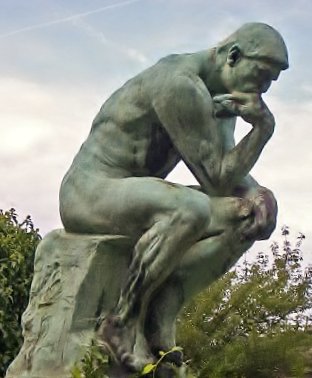
Further Reading:
- Why Insight Alone Does Not Change Behavior - Locking In The Gains
- The Battle For Your Mind - How To Win Inner Freedom In A Digital Age
- How to See Your Thoughts Without Becoming the Story
- How to Interrupt Emotional Spirals Using Thought-Awareness
- Pausing Before You Act - Make It a Meta-Habit
- Rewiring Your Autopilot – How To Harness Your Subconscious Mind
- Why You Need To Be Intimate With Your Own Thinking
- I Do Not Feel Like It - Feelings, Resistance And How To Take Action
Return from: "The Wise Advocate" to: Inner Mastery For Outer Impact or Walking The Talk
Next Article:
How To Trust The Process Of Mindfulness - Right Now
LATEST ARTICLES
Master The Season You Are In - The Key to Fulfilling Your Purpose
 To fulfil your purpose, you must first master the season you are in. One of the biggest mistakes you can make in life is focusing all your energy on the next season instead of learning to master the s…
To fulfil your purpose, you must first master the season you are in. One of the biggest mistakes you can make in life is focusing all your energy on the next season instead of learning to master the s…The Inner Weight of Shame - Sustained By Attentional Fixation
 A Mind That Is Continuously Engaged In Self-Surveillance. Shame is one of the heaviest inner burdens a human being can carry. It does not announce itself loudly or demand attention through drama. Inst…
A Mind That Is Continuously Engaged In Self-Surveillance. Shame is one of the heaviest inner burdens a human being can carry. It does not announce itself loudly or demand attention through drama. Inst…Does Prayer Work? The Psychology of Prayer, Meditation and Outcomes
 Reality Is A Complex System Of Countless Interactions - Including Yours. So does prayer work? The problem is that the question itself is usually framed in a way that guarantees confusion. We tend to a…
Reality Is A Complex System Of Countless Interactions - Including Yours. So does prayer work? The problem is that the question itself is usually framed in a way that guarantees confusion. We tend to a…Living in Survival Mode Without Surrendering Mental Authority
Living in Survival Mode Without Surrendering Mental Authority
 Clear Thinking When You’re Just Trying to Stay Afloat. Many people today are overwhelmed because they are living in survival mode - not temporarily, but as a persistent condition of life. For many, th…
Clear Thinking When You’re Just Trying to Stay Afloat. Many people today are overwhelmed because they are living in survival mode - not temporarily, but as a persistent condition of life. For many, th…Manifestation Without Magic: A Practical Model
 Manifestation without magic is not a softer or more intellectual version of popular manifestation culture. It is a different model altogether. Popular manifestation teachings tend to frame reality as…
Manifestation without magic is not a softer or more intellectual version of popular manifestation culture. It is a different model altogether. Popular manifestation teachings tend to frame reality as…Staying Committed When You Can't See Progress - The Psychology of Grit
 Uncertainty Is Not The Absence Of Progress, Only The Absence Of Reassurance. One of the most destabilising experiences in modern life is not failure, but uncertainty and staying committed when you can…
Uncertainty Is Not The Absence Of Progress, Only The Absence Of Reassurance. One of the most destabilising experiences in modern life is not failure, but uncertainty and staying committed when you can…The Battle For Your Mind - How To Win Inner Freedom In A Digital Age Of Distraction
 From External Events to Inner Events. We often think of “events” as things that happen out there: the traffic jam, the rude comment, the delayed email reply. But what truly shapes our experience is wh…
From External Events to Inner Events. We often think of “events” as things that happen out there: the traffic jam, the rude comment, the delayed email reply. But what truly shapes our experience is wh…How to See Your Thoughts Without Becoming the Story
 A Practical Guide to Thought-Awareness. You can spend your life inside the stories of your mind without ever learning how to see your thoughts clearly and objectively. Most of the stuff we tell oursel…
A Practical Guide to Thought-Awareness. You can spend your life inside the stories of your mind without ever learning how to see your thoughts clearly and objectively. Most of the stuff we tell oursel…The Collison Decision Matrix - A Simple Framework for Better Choices
 The Collison Decision Matrix Is A Practical Everyday Thinking Tool. Most of us spend a surprising amount of time worrying about decisions. From small ones such as what to wear, what to eat, what to te…
The Collison Decision Matrix Is A Practical Everyday Thinking Tool. Most of us spend a surprising amount of time worrying about decisions. From small ones such as what to wear, what to eat, what to te…The Power Of Asking The Right Question
 The Power Of Asking The Right Question Lies In The Quest For Insight. To experience the power of asking the right question you must develop the practice of asking questions. The best way to improve th…
The Power Of Asking The Right Question Lies In The Quest For Insight. To experience the power of asking the right question you must develop the practice of asking questions. The best way to improve th…Site Pathways
 Here is a site pathway to help new readers of Zen-Tools navigate the material on this site. Each pathway is based around one of the many key themes covered on this site and contain a 150 word introduc…
Here is a site pathway to help new readers of Zen-Tools navigate the material on this site. Each pathway is based around one of the many key themes covered on this site and contain a 150 word introduc…
